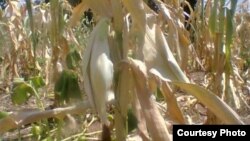Some Zimbabwean farmers in Manicaland, Matabeleland North, Masvingo and Midlands provinces say lack of draught power, costly agricultural inputs and delayed rains are clear signs that Zimbabwe is heading for a disastrous crop season.
Some farmers, who spoke to Studio 7, said they are almost giving up even before the onset of the rains as domestic animals used for tilling the land are too weak while maize seed and other agricultural inputs are too expensive.
One of the farmers, Andrew Maphosa of Lupane District in Matabeleland North province, said farmers need state help to avert a food crisis next year.
“At the moment some of us are giving up because there are no rains. We are looking for part-time jobs so that we can support our families now and next year. Otherwise, there is no reason why we should bother ourselves about growing crops when there are no rains.
“However, I wish to advise the government to help those farmers who still want to till the land by providing agricultural inputs like maize seed.”
Development worker, Everson Ndlovu, said farmers must not give up but should ensure that they plant drought tolerant crops in order to have reasonable harvests this year.
“I want to advice farmers to construct ridges in the fields in order to trap water and at the same time they should refrain from growing maize. Let them go for rapoko, let them grow for sorghum, let them go for millet … you know what there is a market for these crops,” said Ndlovu.
The El Nino weather phenomenon, caused by the warming Pacific Ocean, is expected to devastate eastern and southern African nations this year and in 2016.
UNICEF has already said about 11 million children in eastern and southern Africa, including Zimbabwe, are facing hunger due one of the strongest El Nino weather phenomenon in decades.
In a statement last week, UNICEF said El Nino will cause droughts and floods resulting in untold suffering among children who will be vulnerable to diseases like malaria, diarrhea, cholera and dengue fever.
Scientists say El Nino is caused by the warming of the Pacific Ocean and not climate change though there some believe that this weather condition may be intensifying due to global warming. Some politicians in developed nations like America dispute such school of thought saying climate change is a natural phenomenon and not largely driven by human beings.
International focus on climate change is being largely driven by the Conference of Parties (COP), comprising 191 nations, which sets targets and champions the implementation of strategies for controlling global warming. This year’s conference on climate change organized by COP will be held in Paris, France.




